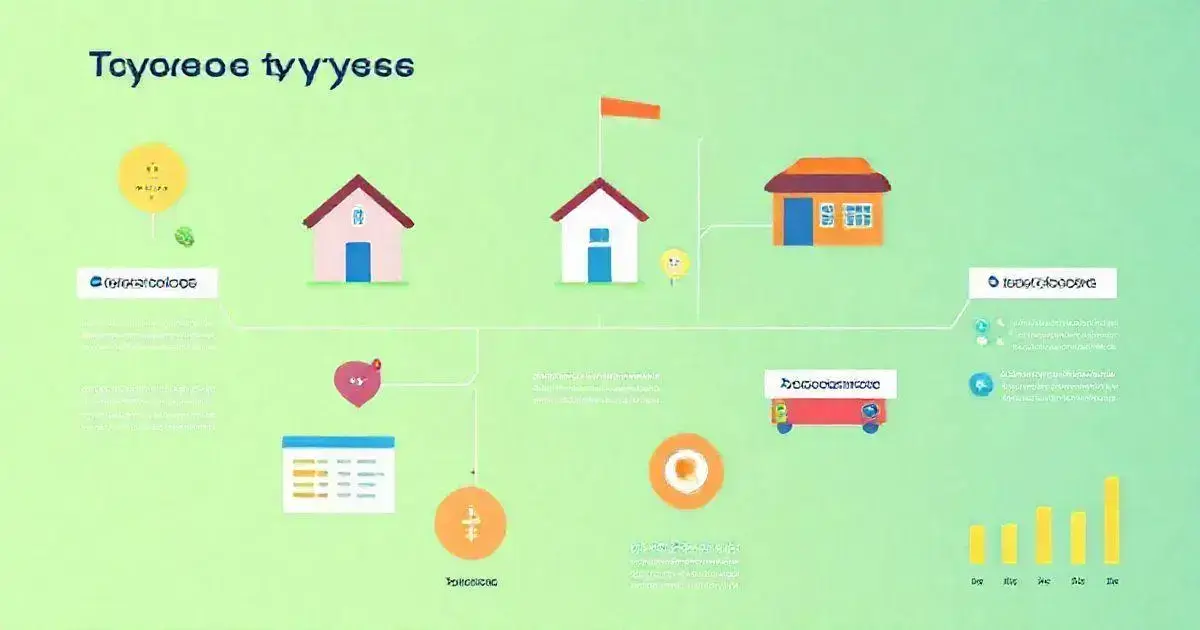Understanding Business Loans
Understanding business loans for small startups is crucial for small startups aiming to grow. These loans come in various forms, offering unique benefits suitable for different needs.
Traditional loans often come from banks and require proof of income and creditworthiness. However, alternative funding options, such as peer-to-peer lending or crowdfunding, can provide faster access to cash without stringent requirements.
It’s important to research each type of loan to find the best fit for your business goals. Consider factors like interest rates, repayment terms, and whether the lender has experience with startups.
Engaging with a financial advisor can also help in navigating these options effectively. Ultimately, business loans for small startups can be a valuable tool to help you achieve your business objectives.
Types of Loans Available

There are various types of loans available for small startups, each designed to meet different financing needs. Exploring business loans for small startups can help you find the right fit for your financial goals.
Traditional bank loans are a common option, providing fixed amounts with set repayment schedules. However, they often require excellent credit scores and substantial documentation.
Alternatively, microloans offer smaller amounts, typically ranging from $500 to $50,000, ideal for new businesses without extensive credit histories. These loans tend to have more lenient qualification criteria and are often provided by non-profit organizations.
Government-backed loans, such as those through the SBA, also support small startups, offering favorable terms, lower interest rates, and repayment flexibility. These loans aim to encourage entrepreneurship.
Another option is online lenders, which can provide quick access to funds without the lengthy approval processes of traditional banks. These lenders often cater to businesses with less-than-perfect credit.
Finally, consider business credit cards as a source of revolving credit. While they can be beneficial for managing cash flow, their interest rates can be higher than other loan options.
Assessing your business’s unique needs will help you choose the best business loans for small startups to fuel your growth.
How to Apply for a Business Loan
Applying for a business loan can seem daunting, but it can be easier by following some essential steps. Start by assessing your needs to determine how much funding you seek and its intended use. This clarity will guide you through the process of securing business loans for small startups.
Next, research different loan options. There are various lenders, each offering different products. Focus on the interest rates, repayment terms, and qualifications required.
Once you identify suitable lenders, prepare your documentation. Common documents include your business plan, financial statements, and personal credit history. A well-prepared package can increase your chances of approval.
Follow this by filling out the application. Be honest and thorough in your responses. Incomplete or misleading information can lead to denial.
After submission, be ready to answer questions from the lender. They may request additional information or clarifications. Being prompt and cooperative demonstrates your commitment.
Finally, if approved, carefully review the loan agreement before signing. Understand the terms and conditions, repayment schedule, and any fees involved. This careful consideration will help you manage your business loans for small startups effectively.
Qualifying for Business Loan Funding

Qualifying for business loans for small startups funding can be challenging, but understanding the requirements can help. Most lenders look at credit scores, which reflect your credit history and financial responsibility. A score of 680 or higher is often needed for better rates.
Next, lenders will examine your business plan. A detailed and realistic plan demonstrates your understanding of the market and how you intend to use the funds. Include financial projections, showing potential revenue and expenses.
Your cash flow is another critical factor. Lenders want to see that you have enough revenue to cover loan payments alongside your operating expenses. Maintaining consistent cash flow can improve your chances of approval.
Collateral may also be required. This means that you offer an asset, such as equipment or property, to secure the loan. If you fail to repay, the lender can claim the collateral.
Finally, having a strong personal financial background can increase your credibility. Lenders often consider your personal finances alongside your business details, especially if your startup is new. Business loans for small startups require a careful assessment of these key factors to increase your chances of success.
Tips for Managing Your Loan
Managing your business loan for small startups is crucial for long-term success. Start by keeping accurate records of your expenses and income. This practice helps you track your cash flow and ensures you can meet your monthly payments.
Next, create a repayment schedule. Understand when payments are due and set reminders to avoid late fees. Consider aligning your repayment dates with your income cycles for better cash management.
It’s also wise to review your loan terms regularly. Knowing the details about interest rates, fees, and repayment options helps you make informed decisions about your loan.
If you experience financial difficulties, communicate with your lender early. Many lenders offer solutions, such as deferments or modified payment plans, to help you through tough times.
Lastly, consider paying more than the minimum payment when possible. This strategy can reduce your interest costs over time and help you pay off your business loan for small startups faster.
Success Stories of Startups

Success stories of startups highlight how businesses can thrive with the right funding and strategies. Tech Startup X secured a business loan for small startups that allowed them to develop their innovative app. Their revenue grew significantly within a year, showcasing the impact of financial support.
Another example is Food Brand Y, which used a microloan to expand its product line. This funding helped them reach new markets and increase sales, proving that small amounts can lead to substantial growth.
Many startups have also turned to crowdfunding as a means of financial backing. Platforms like Kickstarter have enabled businesses to connect with their audience directly, allowing them to gather the necessary funds while validating their product.
In addition, Social Enterprise Z acquired funds through government-backed loans, which enabled them to enhance their community outreach programs. Their success demonstrates how impactful loans can be when aligned with a mission.
These stories remind us that with determination, creativity, and financial support, startups can overcome challenges and achieve their goals, especially when they leverage business loans for small startups effectively.
Business Loans for Small Startups: Final Considerations
Securing business loans for small startups is a vital step toward achieving growth and success. By understanding the various types of loans available and how to qualify, startups can position themselves effectively in the competitive landscape.
Properly managing these loans through accurate record-keeping and timely payments ensures financial stability. Moreover, learning from success stories of other startups can provide valuable insights and motivation.
With determination, a solid plan, and the right financial tools, small startups can thrive and innovate in their respective markets, especially when leveraging business loans for small startups strategically.


